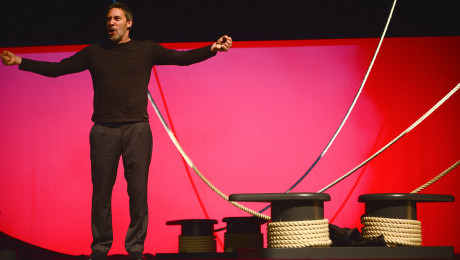Lovers of poetry! Lovers of the long line!
From his deck on The Kennedy Center’s Terrace Theatre, Diogo Infante calls, “Ahoy!”

And the spirit of Alvaro de Campos, aka Fernando Pessoa, rises from an ocean wave.
A part of The Kennedy Center’s Iberian Suite: global arts remix, Maritime Ode had its US premiere last night and, although the piece might not satisfy lovers of action and dramatic tension, for anyone who loves the spiritual catharsis of poetry, it must not be missed.
If you do not know Portuguese, you will be swallowed by the tsunami of sounds coming your way. If you know Portuguese, you will still be swallowed, not by sound but by a veritable tidal wave of desire and loss.
Alvaro de Campos was a mechanical engineer, a fictitious persona created by one of Portugal’s greatest writers, Fernando Pessoa. De Campos wrote poetry, a lot of it. He wrote Maritime Ode. Since Pessoa’s death in 1935, his poetry has only gained in stature in Portugal and around the world.
The Maritime Ode is many things, but mostly it is a celebration of the imagination in an epic voyage taken on an imaginary sea, an inward voyage to a realm of pure beauty and horrible brutality. Returned, the mariner learns to live among real men in a real age of iron and steel.
If you recall, Portugal in the 1400s, led by Prince Henry the Navigator, sailed at the vanguard of European discoveries of Africa, Asia, and the Americas. De Campos’ Maritime Ode seems infected by that history as the poem’s persona stands on a pier and watches the ships come in.
Nostalgia for the great voyage, nostalgia for an age of impossible dreams — so anathema to modernity — both haunt Diogo Infante’s persona as he speaks the poem’s text with beauty and grace.
The poem’s airiness can, at times, be difficult to fathom. And, like Whitman’s Song of Myself, its repetitiveness can seem indulgent. One can, in fact, be lulled by its soft cadence into a mental slumber.
But then it explodes, and Infante’s whole visage explodes with it as he captures the mad rush of the emotional catharsis that the poem embraces. It is a catharsis disconnected from the dramatic, a persona not confronted by some external beast set on destruction, but the persona confronting its own profound sense of existential loss.
The poem’s purging is the purging of imaginary demons, and in this mechanical, technological age, such demons are as real as phantoms.
Infante’s performance is brilliant, as he keeps the poem’s high language as down to earth as possible.
He is supported by the music of guitarist Joáo Gil, an acoustic counter-point to the fiery image of the machine.
The performance-piece is directed by Natália Luiza and, like a conductor, she has made sure that the etherealness of the poetic lines do not push the actor into an equal vagueness.
A simple denotatively provocative set, by Fernando Ribeiro, and lights by Miquel Seabra, gives Director Luiza and actor Infante a free ranging space on which to play the emotional gambit.
A video backdrop, provided by Pedro Sena Nunes, invokes the sky and the sea and the internal recess of the human soul.
And that is exactly where Maritime Ode will take you.
Running Time: 70 minutes.
Maritime Ode plays one more night, tonight, March 21, 2015 at 7:30 pm in the Terrace Theater at The Kennedy Center – 2700 F Street, NW, in Washington, DC. For tickets, call the box office at (202) 467-4600, or purchase them online.
For other events in the Kennedy Center’s Iberian Suite: Global Arts Remix, click here.




